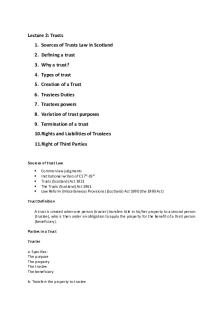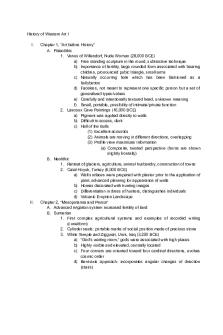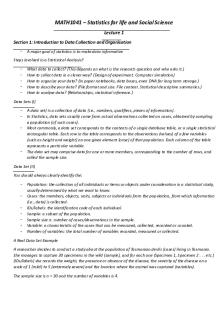Notes PDF

| Title | Notes |
|---|---|
| Author | Eagle C |
| Course | Criminal Law |
| Institution | Victoria University |
| Pages | 6 |
| File Size | 112.7 KB |
| File Type | |
| Total Downloads | 83 |
| Total Views | 181 |
Summary
summary notes...
Description
The Purpose of Arrest An individual may be arrested for a particular purpose, or a number of purposes. The main purposes include: I. ensure the individual will appear in court; Ii. preserve public order; Iii. prevent the continuation or commission of an offence; Iv. protect the safety/welfare of the public/offender; and V. ensure the appearance in court of a witness who has failed to attend court in answer to a summons. Section 458 of the Crimes Act 1958 (Vic).
(1) Any person, whether a police officer or not, may at any time without warrant apprehend and take before a bail justice or the Magistrates' Court to be dealt with according to law or deliver to a police officer to be so taken, any person— (a) he finds committing any offence (whether an indictable offence or an offence punishable on summary conviction) where he believes on reasonable grounds that the apprehension of the person is necessary for any one or more of the following reasons, namely—
Method of Arrest The person arrested must be informed of the substance of the charge or charges. Reasonable force may be used in an arrest. What is reasonable will differ depending on the circumstance
CRIMES ACT 1958 - SECT 462A Use of force to prevent the commission of an indictable offence A person may use such force not disproportionate to the objective as he believes on reasonable grounds to be necessary to prevent the commission, continuance or completion of an indictable offence or to effect or assist in effecting the lawful arrest of a person committing or suspected of committing any offence. In Slaveski v Victoria [2010], it was stated that the force used must
be no more than is necessary and must be proportionate to the circumstances of the situation
Consequences of an Unlawful Arrest There are a number of adverse consequences that follow from an unlawful and/or flawed arrest. These include: I. The suspect may be able to take civil action against the police and recover damages fro unlawful imprisonment – refer to Landinin v NSW [2008]. Ii. The evidence may be tainted, and thus, inadmissible – i.e. an admission. Iii. It may act as a defence to a charge of escaping lawful custody – refer to Police v Thomson [1969]. Iv. Gives rise to a Writ of Habeas corpus (“produce the body”) in the Supreme Court as the individual is being detained without being arrested and/or being held for an unreasonable time What is a Warrant? A warrant is a document issued by a legal or government official authorising the police or another body to make an arrest, search premises, or carry out some other action relating to the administration of justice. A warrant is a legal document that allows someone to do something, especially one that is signed by a judge or magistrate and gives the police permission to arrest someone or search their house Arrest Without a Warrant If an arrest does not fit within any of the categories listed below, it is unlawful and can be resisted through the use of reasonable force. Powers of arrest are set out in sections 458, 459 and 459A of the Crimes Act 1958 (Vic). Again, there are no common law powers of arrest. Section 457 provides that no person shall be arrested without warrant except under the Crimes Act (Vic) or some other Act giving express power to arrest without warrant. Section458(1)(a) of the Crimes Act 1958 (Vic) means that any person found committing an offence (other than a breach of regulations) can be arrested without warrant by anyone (not only the police) who reasonably believes the arrest is necessary for any of the following reasons: 1.to ensure the appearance of the offender (person committing the offence) before court; 2.to preserve public order;
3.to prevent the continuation or repetition of the offence the commission of a further offence; or 4.for the safety or welfare of the public or offender Found Committing Section 462 of the Crimes Act 1958 (Vic) means that the expression “found committing” extends to the case of a person found doing any act, or behaving in some way or in circumstances that mean that there are reasonable grounds for another person to believe that the person found is guilty of an offence. This a broad definition
Apprehending – Summary Offences Section458(3) means that anyone apprehended for a “summary” offence shall be held in custody only so long as any of the reasons listed above for the arrest continue. If, before a charge has been laid, the reasons for arrest cease to apply, then the person must be released without bail, whether or not a summons has been issued. However, in practice, police often detain people while a summons is prepare Section459 of the Crimes Act 1958 (Vic) provides that any police officer or protective services officer (but not a citizen) may at any time, without warrant, apprehend any person believed on reasonable grounds to have committed an indictable offence (including one that can be determined summarily) in Victoria or elsewhere, if that offence is an indictable offence against the law of Victoria. Under this arrest power, there is no need for the accused person to be found committing the offence. A protective services officer must hand the person arrested over to a police officer as soon as practicable after the arrest.In the case of indictable offences that have already been committed, police may either arrest the person or charge them by summons, although they almost always arrest for serious offences. Note that only police and protective services officers have this power.
Arrest with a Warrant A warrant is normally used in situations where a person on bail or summons has failed to attend court as required, if there is a hunt proceeding for an identified major offender, or
in the case of an escapee from prison. A magistrate or registrar should not issue an arrest warrant if a summons would be just as effective in ensuring the appearance of the accused at court. Before issuing a warrant, a magistrate or registrar must be satisfied that:•the defendant won’t answer a summons; or•the defendant has absconded or is likely to abscond; or•it is required for another good cause – Criminal Procedure Act 2009 (Vic), s12(5) Issuing a Warrant for Arrest Justices of the peace may no longer issue warrants unless they are also magistrates, coroners or judges. For Commonwealth offences committed in the state where a warrant has been issued, the federal police and customs officers are obliged to apply the law of the state in which the offence was committed. A significant exception to the general requirements in relation to arrest and detention is contained in theAustralian Security Intelligence Organisation Act 1979(Cth). The Act provides for the detention for up to seven days (168 hours) of a person (not necessarily a suspect) for questioning under a warrant, where there are reasonable grounds for believing that it will assist in the collection of intelligence in relation to a terrorism offence.
Entry and Search Without Warrant StatutePursuant to s 459A of the Crimes Act 1958 (Vic), the police may enter and search any place without a warrant for the purpose of finding and arresting persons who, on reasonable grounds, are believed to be there and to have committed a serious indictable offence, or to have escaped from legal custody.
(1) A police officer may, for the purpose of arresting under section 458 or 459 or any other enactment a person whom he—
(a)
believes on reasonable grounds— (i)
to have committed in Victoria a serious indictable offence
(ii) to have committed an offence elsewhere which if committed in Victoria would be a serious indictable offence (iii)
to be escaping from legal custody; or
(b)
finds committing a serious indictable offence—
enter and search any place where the police officer on reasonable grounds believes him to be.
Statutory power of warrants
CRIMES ACT 1958 - SECT 92 Search for stolen goods
Search for stolen goods
(1) If a magistrate is satisfied by evidence on oath or by affirmation or by affidavit that there is reasonable cause to believe that any person has— (a)
in the custody or possession of the person; or
(b)
on any premises (including any vehicle on or in those premises) of the person; or
(c)
on or in a particular vehicle located in a public place—
any stolen goods, the magistrate may grant a warrant to search for and seize those goods.
CRIMES ACT 1958 - SECT 465 Issue of search warrant by magistrate
CRIMES ACT 1958 - SECT 465 Issue of search warrant by magistrate
(1) Any magistrate who is satisfied by the evidence on oath or by affirmation or affidavit of any police officer of or above the rank of senior sergeant that there is reasonable ground for believing that there is, or will be within the next 72 hours, in any building (including any vehicle
in that building), receptacle or place (including any vehicle on or in that place) or on or in a particular vehicle located in a public place— (a) anything upon or in respect of which any indictable offence has been or is suspected to have been committed or is being or is likely to be committed within the next 72 hours; or (b) anything which there is reasonable ground to believe will afford evidence as to the commission of any such offence; or (c) anything which there is reasonable ground to believe is intended to be used for the purpose of committing any indictable offence against the person for which the offender may be arrested without warrant— may at any time issue a warrant authorizing some police officer or other person named therein to search such building receptacle, place or vehicle for any such thing and to seize and carry it before the Magistrates' Court to be dealt with according to law....
Similar Free PDFs
Popular Institutions
- Tinajero National High School - Annex
- Politeknik Caltex Riau
- Yokohama City University
- SGT University
- University of Al-Qadisiyah
- Divine Word College of Vigan
- Techniek College Rotterdam
- Universidade de Santiago
- Universiti Teknologi MARA Cawangan Johor Kampus Pasir Gudang
- Poltekkes Kemenkes Yogyakarta
- Baguio City National High School
- Colegio san marcos
- preparatoria uno
- Centro de Bachillerato Tecnológico Industrial y de Servicios No. 107
- Dalian Maritime University
- Quang Trung Secondary School
- Colegio Tecnológico en Informática
- Corporación Regional de Educación Superior
- Grupo CEDVA
- Dar Al Uloom University
- Centro de Estudios Preuniversitarios de la Universidad Nacional de Ingeniería
- 上智大学
- Aakash International School, Nuna Majara
- San Felipe Neri Catholic School
- Kang Chiao International School - New Taipei City
- Misamis Occidental National High School
- Institución Educativa Escuela Normal Juan Ladrilleros
- Kolehiyo ng Pantukan
- Batanes State College
- Instituto Continental
- Sekolah Menengah Kejuruan Kesehatan Kaltara (Tarakan)
- Colegio de La Inmaculada Concepcion - Cebu















